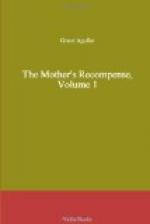“Look, dear papa, is not this worth receiving?” she exclaimed, holding up the well-filled letter, and looking the personification of innocent and radiant happiness, her fair luxuriant hair pushed in disorder from her open forehead and flushed cheek, her blue eyes sparkling with irresistible glee, which was greatly heightened by her glowing smiles. It was impossible to look on Emmeline without feeling every ruffled emotion suddenly calmed; she was so bright, so innocent, so fair a thing, that if peace and kindness had wished to take up their abode on earth, they could not have found a fairer form wherein to dwell. As St. Eval gazed upon the animated girl, he could not help contrasting her innocent and light-hearted pleasure with his own unmitigated sorrow.
“Your presence and your joy are mistimed, my dear Emmeline; your father appears engaged,” said Mrs. Hamilton, entering almost directly after her child, and perceiving by one glance at her husband’s face that something had chanced to disturb him. “Control these wild spirits for a time till he is able to listen to you.”
“Do not check her, my dear Emmeline, I am not particularly engaged. If St. Eval will forgive me, I would gladly hear some news of our dear Mary.”
“And pray let me hear it also. You know how interested I am in this dear friend of yours, Emmeline,” replied St. Eval, struggling with himself, and succeeding sufficiently to speak playfully; for he and Emmeline had contrived to become such great allies and intimate friends, that by some sympathy titles of ceremony were seldom used between them, and they were Eugene and Emmeline to each other, as if they were indeed brother and sister.
Laughingly and delightedly Emmeline imparted the contents of her letter, which afforded real pleasure both to Mr. and Mrs. Hamilton, by the more cheerful, even happier style in which she had written.
“Now do you not think I ought to be proud of my friend, Master Eugene? is she not one worth having?” demanded Emmeline, sportively appealing to the young Earl, as she read to her father some of Mary’s affectionate expressions and wishes in the conclusion.
“So much so, that I am seized with an uncontrollable desire to know her, and if you will only give me a letter of introduction, I will set off for Geneva next week.”
Emmeline raised her laughing eyes to his face, with an expression of unfeigned amazement.
“A most probable circumstance,” she said, laughing; “no, Lord St. Eval, you will not impose thus on my credulity. Eugene St. Eval, the most courted, flattered, and distinguished, leave London before the season is over—impossible.”
“I thank you for the pretty compliments you are showering on me, my little fairy friend, but it is nevertheless true. I leave England for the Continent next week, and I may as well bend my wandering steps to Geneva as elsewhere.”
“But what can you possibly be going on the Continent again for? I am sure, by all the anecdotes you have told me, you must have seen all that is worth seeing, and so why should poor England again be deserted by one of the ablest of her sons?”




